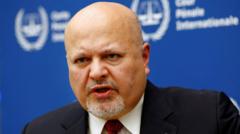These developments arrive at a crucial moment when the ICC faces significant scrutiny over Khan's actions, including a push for arrest warrants concerning the Gaza conflict. The president of the assembly governing the ICC, Paivi Kaukoranta, acknowledged conversations between the IOM and the alleged victim but noted that the IOM could not progress with an investigation at this stage. Reports suggest the female lawyer involved expressed skepticism regarding the IOM’s ability to handle the situation appropriately.
While Khan has denied any wrongdoing, he expressed disappointment upon learning that the accusations would become public, insisting that there is no truth to the allegations. He emphasized the critical importance of safeguarding everyone's rights during this sensitive period for the ICC.
Despite these allegations surfacing before his call for arrest warrants against Israeli leaders for purported war crimes in Gaza, they have intensified challenges within the ICC. The court, based in The Hague, is now entangled in a complex situation, amid accusations of politicization by its critics. Kaukoranta reiterated the ICC's commitment to a zero-tolerance policy against misconduct, including harassment and abuse of authority.
As the ICC grapples with this internal crisis, the outcome of the investigation into Khan's alleged actions remains to be seen, with both the court's image and its future functions hanging in the balance.
While Khan has denied any wrongdoing, he expressed disappointment upon learning that the accusations would become public, insisting that there is no truth to the allegations. He emphasized the critical importance of safeguarding everyone's rights during this sensitive period for the ICC.
Despite these allegations surfacing before his call for arrest warrants against Israeli leaders for purported war crimes in Gaza, they have intensified challenges within the ICC. The court, based in The Hague, is now entangled in a complex situation, amid accusations of politicization by its critics. Kaukoranta reiterated the ICC's commitment to a zero-tolerance policy against misconduct, including harassment and abuse of authority.
As the ICC grapples with this internal crisis, the outcome of the investigation into Khan's alleged actions remains to be seen, with both the court's image and its future functions hanging in the balance.





















